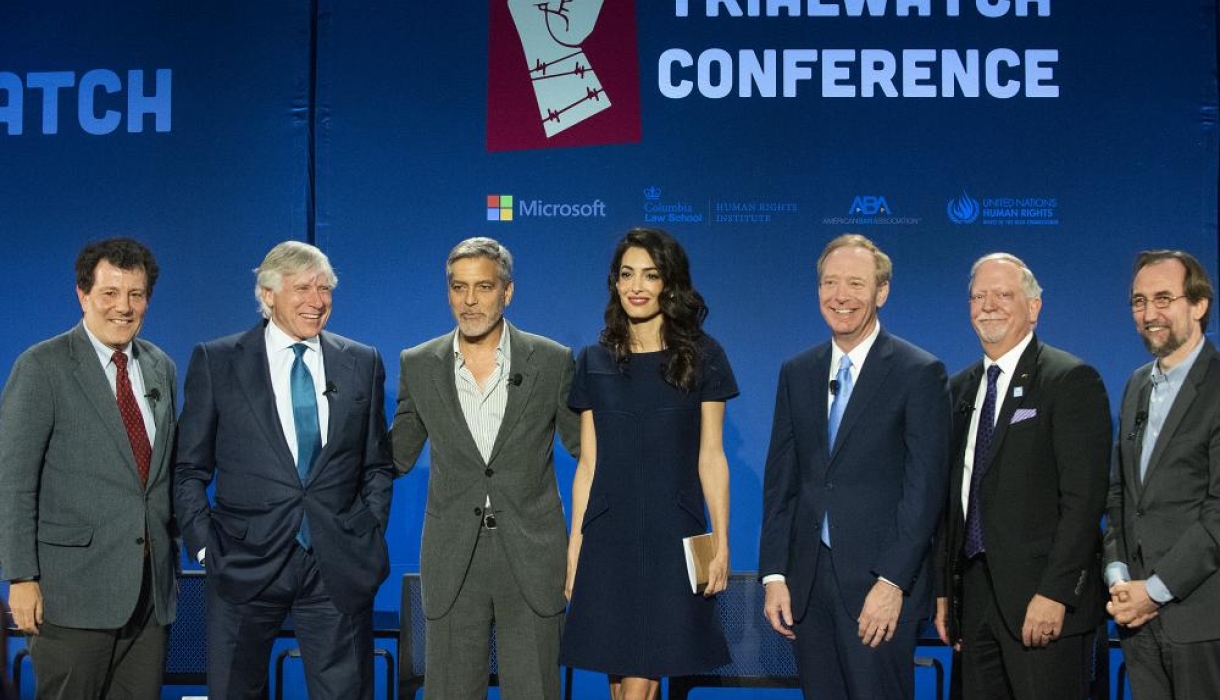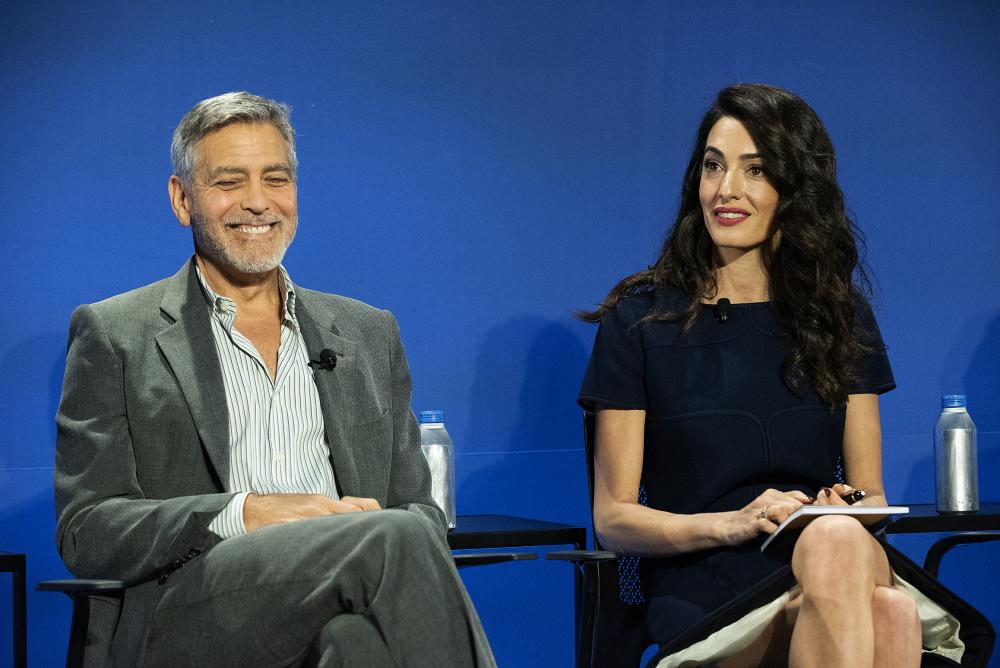Human Rights Institute and Clooney Foundation for Justice Train Observers to Monitor Trials Where Human Rights May Be at Risk
Human Rights Clinic students working with TrialWatch have begun monitoring legal proceedings to help safeguard rights of journalists, dissidents, and LGBTQ individuals.

Photo above (from left): New York Times op-ed columnist Nicholas Kristof, Columbia University President Lee C. Bollinger ’71, Clooney Foundation for Justice Co-Presidents George and Amal Clooney, Microsoft President Brad Smith ’84, American Bar Association President Bob Carlson, and former United Nations High Commissioner for Human Rights Zeid Ra’ad al-Hussein. Photo: Beatrice Moritz / Clooney Foundation for Justice
Columbia Law School’s Human Rights Institute and the Clooney Foundation for Justice formally launched the TrialWatch program with a day-long conference at the Law School featuring human rights advocates, academics, journalists, and lawyers urging action to protect free speech and guarantee fair trials internationally.
TrialWatch will train and send monitors to observe legal proceedings in nations where human rights may be at risk, develop “fairness reports,” and if necessary, assist defendants in pursuing remedies in human rights courts. Monitors will observe trials involving journalists, LGBTQ persons, women and girls, religious minorities, and human rights defenders.
“Without the fair administration of justice, it is not possible to hold the powerful to account. There can be no democracy, no freedom of speech, no safety for minorities,” said Amal Clooney, foundation co-president and a senior fellow at the Human Rights Institute. “We measure corruption by governments, but not by courts. We monitor the fairness of elections, but not trials. Leaders accused of holding political prisoners can get away all too easily with bare denials and stock answers about the separation of powers. We need extensive monitoring, hard data, and committed advocacy if this is to change.”
Clooney and co-president George Clooney spoke at the April 25 launch event hosted by the Law School along with Dean Gillian Lester, the Lucy G. Moses Professor of Law; Columbia University President Lee C. Bollinger ’71; Microsoft President Brad Smith ’84; former United Nations High Commissioner for Human Rights Zeid Ra’ad al-Hussein; and American Bar Association President Bob Carlson. Their panel discussion was moderated by New York Times op-ed columnist Nicholas Kristof.
Columbia Law announced in December that it would partner with the Clooney Foundation for Justice (CFJ) and the American Bar Association (ABA) to develop TrialWatch. A Microsoft-funded TrialWatch Legal Fellow, Sarah Mehta, is implementing the program and working with students in the Human Rights Clinic to train them in trial observation. The program has already sent Human Rights Clinic students Nicole O’Donnell ’19, Andie Reyes ’20, and Sophie Tarazi ’19 to monitor trials in Zambia and Turkey.
“Columbia has a long and influential history in shaping international human rights law and institutions,” Dean Lester said, citing the Human Rights Institute and its work to advance research and best practices around trial monitoring as it relates to international human rights law and advocacy.
TrialWatch “is a logical extension of Columbia’s commitment to human rights. It represents a novel innovation that has the potential, through technology and global cooperation, to ensure the fair administration of justice and the dismantling of corrupt systems of governance around the world,” Lester said. “These are principles for which Columbia Law School has advocated since before the passage of the [1948] Declaration of Human Rights, and we are so pleased to continue to advance those ideals through TrialWatch today.”
Commitment to human rights is embedded “deep in the culture of the Law School,” University President Lee C. Bollinger ’71 emphasized, citing historic cases such as Brown v. Board of Education and New York Times Co. v. Sullivan, where “the Law School was right there in the midst of it.”
The ABA has been monitoring trials since 2011 though its Justice Defenders Program. “What we’ve learned is that monitors matter. Having someone in the courtroom matters,” Carlson said. “It isn’t perfect, it isn’t going to fix everything, but, yes, it has an impact.”
The Office of the High Commissioner for Human Rights at the United Nations developed an online training program for trial monitors. Microsoft has created an app for TrialWatch monitors to use, which provides speech-to-text and language translation and allows for standardized information across trials.
“There is no shortage of apps in the world, but there is definitely a shortage of apps that are changing the world,” said Smith, a longtime supporter of the Human Rights Clinic’s work.
The TrialWatch app also can quickly send information to TrialWatch legal experts via the cloud, so that the data—and the monitor—is not vulnerable to interference. With training and the app, monitors need not be lawyers themselves, which will allow for the monitoring of many more trials, especially in remote places.
Public naming and shaming of corrupt trials may not force widespread change in countries with poor human rights records—targeted international sanctions are more immediately effective—but it is a necessary first step, Amal Clooney said.
“The first line of attack is, can you shame the judge? If you can’t shame the judge, maybe you can shame the government. If you can’t shame that government, maybe you can shame other governments who are doing trade deals or giving other forms of assistance. If you can’t do that, maybe you can get to businesses,” she said.
Without trial monitoring, governments won’t be held accountable for human rights abuses, Clooney said. “It’s incredibly easy for governments to get away with this kind of behavior. That’s why they’re using trials, because it gives them a way to silence dissent with a veil of legitimacy.”
With data from the monitors, TrialWatch will assign trials a fairness grade, which ultimately will be used to compile a “global justice index” to evaluate countries’ judicial integrity.
# # #
Published on April 26, 2019
